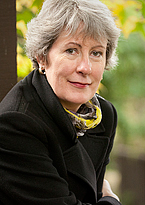
Lewis (Photo by L.A. Cicero)
My Q&A with Welsh poet Gwyneth Lewis appeared online today here (along with a splendid poem from her collection, Chaotic Angels). If you have never heard the Welsh language spoken, you are in for a treat: Gwyneth reads from her Welsh poem, “The Language Murderer,” in a video clip here.
My research on Gwyneth prior to the interview revealed an unexpected correspondence: We had both studied with the late Nobel laureate Joseph Brodsky. Brodsky’s teaching style could be rough weather, but it was always unforgettable and, for many of us, foundational. Among the many Brodsky students who pepper the literary landscape are the poets Linda Gregerson (I met her during Stanford’s “Milton at 400” celebration) and Gjertrud Schnackenberg, poet and translator Peter Filkins, and the critic James Marcus.
In Joseph Brodsky: Conversations, I recounted James Marcus’s description of a Brodsky class:
Marcus, while attending Columbia University, heard rumors of a student in the previous term whose work Brodsky
had ridiculed so mercilessly that she burst into tears in class. … “Throughout the semester he would bum cigarettes from the few addicts in the class, tearing the filters off with his teeth before applying a match.” Brodsky explained his worldview to his students: “Poetry, in his estimation, was the glue of civilization, and language the repository of time itself.” Later in the semester, after assigning a short paper for class, he warned them, “Assume that this may be the last thing you write. … Don’t forget, you could get hit by a car after you hand it in. Keep that thought in mind.” While it may have been “grandiose nuttiness” from anyone else, Marcus concludes that Brodsky was merely extending his own “high seriousness about writing to his students” — few of whom deserved it.
Gwyneth said she still carries the big fat Mont Blanc pens that Brodsky favored, in memoriam.
I recalled that Brodsky said, at the time that he received the Nobel, that “he guessed” he could finally call himself a poet. Reviewing Ludmila Shtern’s Brodsky: A Personal Memoir for the Kenyon Review, I wrote: “Facile journalistic questions, so often spotlighting the  ‘vulgarity of the human heart,’ occasionally evoked his out-of-the-box thinking, when one could get beyond the breezy or brush-off answers. Repeatedly asked about when he realized he had a call to write poetry, Shtern recalls him answering, ‘I still don’t know if it’s my calling,’ or ‘since last Saturday.'”
‘vulgarity of the human heart,’ occasionally evoked his out-of-the-box thinking, when one could get beyond the breezy or brush-off answers. Repeatedly asked about when he realized he had a call to write poetry, Shtern recalls him answering, ‘I still don’t know if it’s my calling,’ or ‘since last Saturday.'”
Yet today, I said to Gwyneth, every high school student who has scrawled a rock lyric feels free to assume the title.
So where did Lewis stand on this question? She respectfully disagreed with Brodsky:
“But I think also in a way you can be too shy in calling yourself a poet. It took me years to bring myself to the point where I could say that. Another poet said to me at one point, ‘Look, you have to decide, “Are you or are you not?” That moment where you have to say [she inhaled deeply], ‘Yes, I am,’ is an important rite of passage. But it’s certainly not something to be used in a facile way.”
The choice is not without perils:
I remember one time I was working in New York, for a man – something to do with oil. Anyway, he gave me a lift home and he asked me, “What do you do?” and I said, “I’m a poet.”
“Oh, wake up, honey!” he said. I’ve often thought that perhaps he was the one who had to wake up.

January 9th, 2010 at 6:52 pm
Great stuff. Love the last line, especially.
February 3rd, 2010 at 2:11 am
good poet…
http://zipclue.com